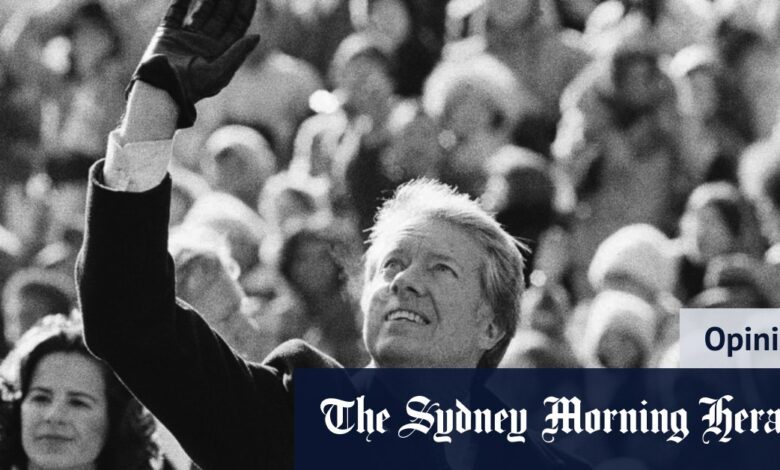a challenged presidency, a life of moral courage

A few days after losing re-election in 1980, president Jimmy Carter attended a tribute to Aaron Copland that included the composer’s Fanfare for the Common Man. If any president embodied that work, it was Carter. Citizen, veteran, farmer, governor, president, Sunday school teacher, peace promoter, home builder for those without shelter.
Carter was the antidote to the disgraced president Richard Nixon and all the damage he had inflicted on America’s democracy. Carter projected honesty, compassion, religious rectitude, morality, racial justice and public service. Rosalynn, his life partner in marriage and governance, his wife of 77 years and first lady, was as devoted to public service as her husband.

President Jimmy Carter waves to the crowd while walking with wife Rosalynn and their daughter, Amy, to the White House following his inauguration on January 20, 1977.Credit: AP
Carter’s virtues embroidered his presidency. He worked so hard. His ambitions were noble. Carter’s approval rating was 75 per cent in his first months in office in 1977. But a series of events overtook him. Carter’s highest priority, a national energy plan, took 18 months to enact and was only a marginal success. In 1979, the United States was hit with an oil shock spurred by Iran and OPEC that cut supplies and drove up prices. There were petrol lines everywhere.
That summer, the country was gripped by a sense of profound drift. For 10 days, Carter retreated to Camp David for meetings and consultations with experts and citizens to help him find answers to the country’s deepening malaise. Carter came down from the mountain and delivered a sermon to the country on what was wrong.
“It is a crisis of confidence,” he said. “It is a crisis that strikes at the very heart and soul and spirit of our national will. We can see this crisis in the growing doubt about the meaning of our own lives and in the loss of a unity of purpose for our nation. The erosion of our confidence in the future is threatening to destroy the social and the political fabric of America.”
Loading
A few days later, Carter fired five members of his cabinet. His approval rating sank to 30 per cent. The American people’s loss of confidence was in the president and his ability to govern.
In November 1979, following the return of Ayatollah Khomeini and the overthrow of the Shah, who was aligned with the West, the US embassy in Tehran was seized and 52 American diplomats were taken hostage. A rescue mission failed spectacularly in April 1980, with American service members lost when their helicopters crashed in the desert. The Iranians, intent on further humiliating America and its leader, did not release the hostages until moments after Carter ceased being president.
https://static.ffx.io/images/$zoom_0.5899443539842395%2C$multiply_0.7554%2C$ratio_1.776846%2C$width_1059%2C$x_267%2C$y_93/t_crop_custom/q_86%2Cf_auto/t_smh_opinion_no_age_social_wm/1138e1e4cb7d4e97820e8795059fbec5b9f7b6fd
2024-12-29 18:50:00




